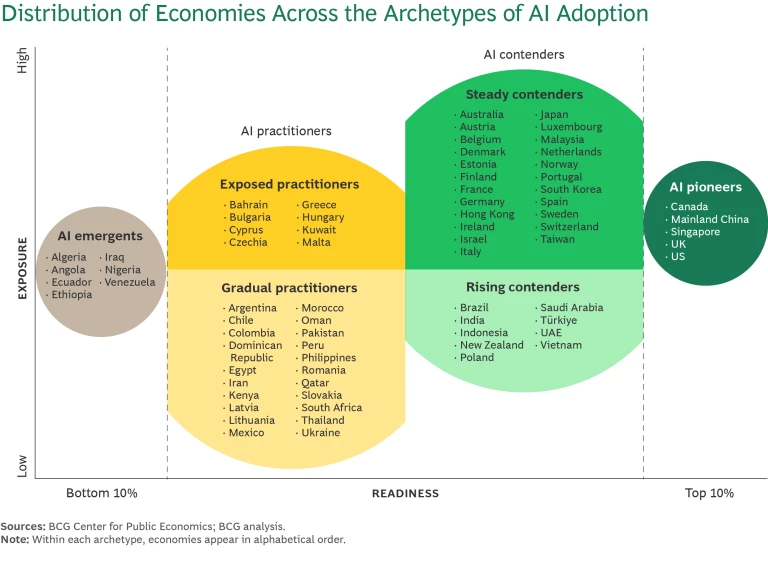Views vary on how much AI is changing the world today, but one thing is clear: the technology is on course to shape the future of economic development .
Business leaders expect large impacts on operations and value over the next decade. Worldwide AI spending will more than double to $632 billion by 2028, according to IDC. The pace and expansiveness of this growth makes AI an economic priority in every region on the globe.
That’s why BCG is introducing our AI Maturity Matrix , which assesses 73 global economies in a new report and an interactive dashboard. Our research identified six archetypes of AI economic development and potential. (See the exhibit.) This matrix provides a broad view of global adoption: the vast majority of economies are gradually adopting AI, but there is a small, influential group of AI pioneers that are leading the way.

Exposure and Readiness
We sought to understand each economy’s level of exposure to AI by sector. This study defines exposure as the potential for AI to impact an economy negatively or positively. For example, exposure could lead to job displacement because of automation—or exposure could also lead to new employment opportunities. Job displacement, though, is only one dimension of exposure. We also analyzed the readiness for AI of each economy. Readiness for AI refers to an economy’s ability to effectively implement and integrate the technology.
Six sectors are most exposed to AI-driven changes. These include information and communication; high-tech goods; retail; financial services; public services; and motor vehicles manufacturing.
AI can create positive spillover effects throughout an economy, spurring a shift in the GDP. Deployment and experimentation with AI in one industry can spur growth in adjacent sectors and allow new use cases to form.
Leading AI economies—the AI pioneers—are out in front in skills, R&D, ecosystems, and investments. The bulk of economies aren’t supporting enough research or investment, slowing their ability to foster startups or deploy homegrown solutions.
The ambition to engage AI is high throughout the world—but ambition alone isn’t enough. Most governments have communicated their strategies or created AI ministries. Yet they must also go further and take proactive, concrete actions, such as forming test beds for AI R&D and supporting or complementing private sector innovation.
Ultimately, exposure to the changes brought by AI is inherent in today’s world. Every economy has at least some sector exposure to AI. Yet an economy with high exposure isn’t necessarily in a bad spot—on the contrary, some of the most exposed are also the most prepared.
Next Steps for Policymakers
We propose a set of initiatives for each archetype:
- AI emergents are at the nascent stages of their AI journey. They should put in place the foundational elements to drive adoption, including international investment and sources of talent and training.
- AI contenders and AI practitioners should specialize in niche AI markets and explore how key sectors can use AI for efficiency or new revenue lines. It will also be key to establish flexible rules for experimentation and address emerging AI ethical questions.
- AI pioneers have advanced capabilities. They can extend their leadership by integrating themselves further into the global tech supply chain. They should also continue to author and enact groundbreaking regulations and standards around AI.
AI and its development will reshape the world, posing both challenges and opportunities for societies far into the future. With BCG’s AI Maturity Matrix, we hope to offer policymakers a practical framework to navigate the evolving AI landscape and harness AI’s potential to strengthen economies and enhance societal well-being.
The authors would like to thank Joerg Hildebrandt, Steve Mills, David Zuluaga Martinez, Daniel Kiefer, Marc Roman Franke, Amy MacDougall, Masahiro Nakagawa, Yvonne Zhou, Vincent Chin, Lars Littig, Tauseef Charanya, Faris Alfaris, Dwaa Osman, Nour Chamseddine, Laurence Genillard, María Martínez Embil, and Usman Chaudhry for their valuable contributions to this report.















